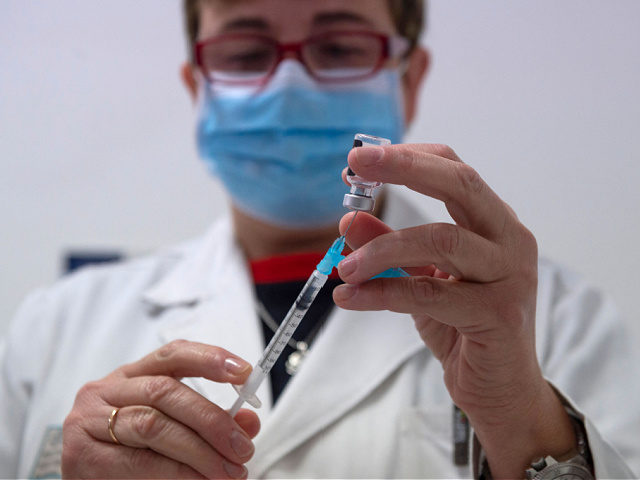China’s state-run Global Times on Thursday reported that BioNTech, the German company that partnered with American company Pfizer to produce its coronavirus vaccine, is “considering to evaluate” mixing its mRNA product with the vaccine manufactured by China’s Fosun Pharma.
This consideration and evaluation is part of the Chinese government’s approval process for the Pfizer vaccine. BioNTech CEO Ugur Sahin said his company’s talks with Chinese officials have been “encouraging.”
According to the Global Times, the BioNTech vaccine will probably be “landing” soon in Shanghai, where Fosun Pharma is based, and also hosts a sizable population of foreigners who “want a BioNTech’s shot for vaccine recognition when returning to their homeland.” Delivery drills for vaccine supply chains in China are reportedly underway. Chinese state media outlets make a point of not referring to the vaccine by the American partner company name.
Chinese Center for Disease Control and Prevention immunologist Shao Yiming said the BioNTech vaccine “is expected to be the first foreign-developed COVID-19 [Chinese coronavirus] vaccine that China will import to pave the way for mixed shots in sequential inoculation, considering its good efficacy.”
The idea for these “mixed shots” appears to involve using Fosun Pharma’s products for a “booster shot,” since Sahin said the antibody response from the primary vaccination “declines over time.”
Sahin added that BioNTech is “making efforts to improve its formulation” so the vaccine can be stored for longer without requiring heavy refrigeration, and to make it effective against more of the variants and mutations of Chinese coronavirus.
China has been having difficulty developing its own mRNA vaccine, although its first domestically designed mRNA product, ARCoV, is supposed to begin Stage Three human trials in Mexico next month.
Existing Chinese vaccine products, like those produced by Sinovac and Sinopharm, use the older technology of inactivated viral cells – to put it simply, patients are injected with dead virus cells to develop immunity without becoming as sick as the live virus would make them.
mRNA or “messenger RNA” technology, on the other hand, injects the patient with part of the genetic code from the virus, programming the human body to manufacture the type of proteins the virus normally produces and trigger the desired immune response without ever introducing the actual virus to the patient’s system.
As Sahin’s comments indicated, mRNA technology is highly effective and reliable, but such vaccines are more difficult to store and transport. The strategy for BioNTech deployment in China seems to involve using the mRNA product for vaccination but Chinese inactivated-virus vaccines for booster shots, as they would be easier to store and distribute.

COMMENTS
Please let us know if you're having issues with commenting.